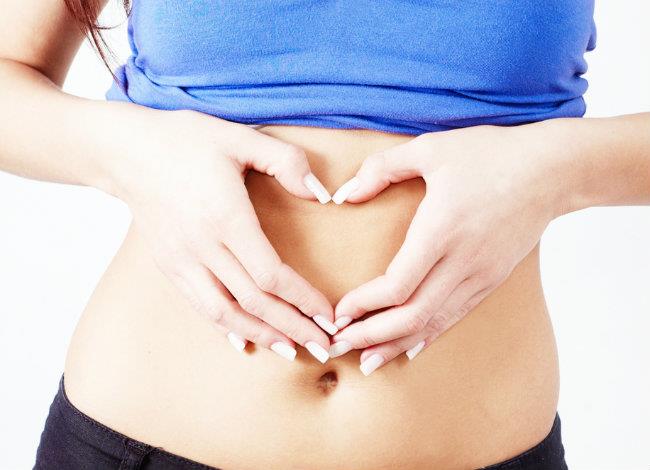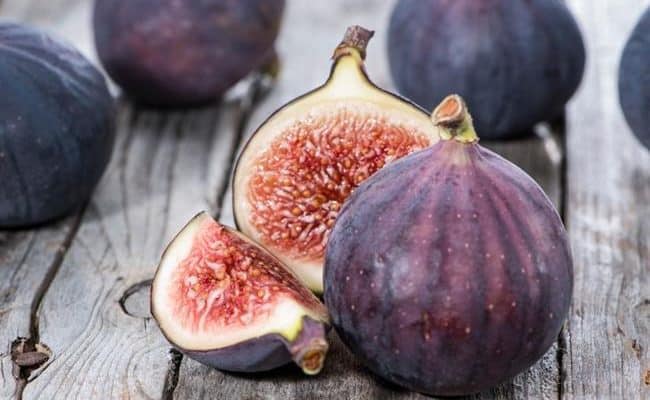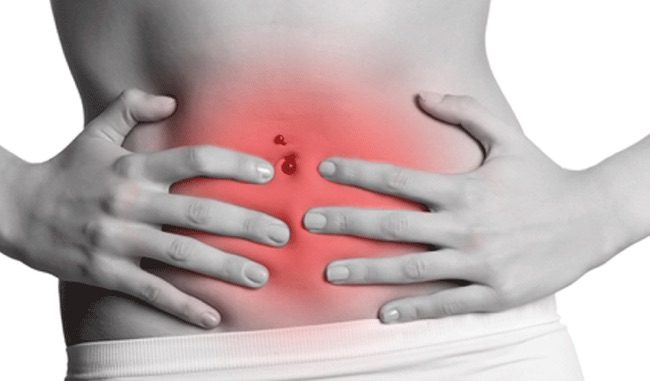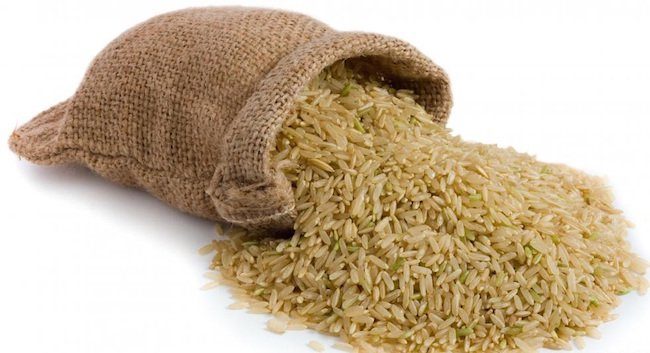
With close to one out of three Americans claiming to experience bloating, you or someone you know probably suffers from this condition.
Research suggests between 6-31% of the general population experience bloating, and people with digestive conditions like Irritable Bowel Syndrome (IBS) can experience bloating more often (1).
What is bloating?
Bloating refers to the abdomen feeling swollen or inflated. It can vary in intensity and duration. Sometimes, but not always, the belly can actually be distended with bloating.
Excess gas (belching or flatulence) may or may not accompany bloating.
Bloating can have many causes, but your diet can be a main factor for reducing or preventing bloating.
11 easy tips for reducing or preventing bloating
- Eat slowly and chew thoroughly
- Put your fork down in between bites
- Try a low FODMAP diet
- Avoid getting constipated
- Eat smaller portions
- Cut out other ways you swallow air: straws, carbonated drinks and chewing gum
- Take antibiotics for bacterial growth in the intestine
- Get more probiotics in your diet
- Peppermint oil may help symptoms for IBS
- Consult your doctor for medications or herbal remedies
- Keeping a food log can help you identify patterns with bloating
Keep in mind combining some of these tips may be needed to best help control your bloating, and you should consult your healthcare team first before making any changes.
The exact causes of bloating are not always well understood and can vary person to person.
Must Read: Why is my stomach getting bigger
1. Eat slowly and chew thoroughly
If you have bloating accompanied with excess belching and/or flatulence, you may be swallowing too much air when you eat. Excess air may be a factor for feeling bloated.
Eating too fast and not chewing your food are ways you can swallow excess air. To combat this, slow down when you eat. Chew your food thoroughly instead of inhaling it.
Mayo Clinic (2) suggests eating on the run or when you are stressed can increase the amount of air you swallow while eating.
Make eating a relaxing event instead of cramming food down your throat because you only have a few minutes to eat. If you multi-task when you eat, turn off other distractions and just focus on your food.
Chewing your food adequately is an important step in digestion; it breaks food down for further digestion in the stomach.
How many times should you chew your food?
A 2011 study (3) compared differences in chewing between obese and lean subjects. Researchers found obese participants had a higher food ingestion rate and lower number of chews compared to lean subjects.
Both obese and lean participants consumed less food with higher number of chews (40) compared to less chews (15).
While there is no magic number of chews per bite, chewing food more thoroughly, around 30-40 chews per bite may be a good goal. However, there is no need to get excessive with over chewing your food.
2. Put your fork down in between bites
Slowing down when you eat can be hard in our fast paced lifestyle. How can you learn to slow down when you eat? A practical way to slow you down is to put your fork (or spoon) down in between bites.
If you are eating something with your hands, put your food down in between bites.
Slowing down when you eat will not only lower risk for swallowing excess air, it can also help you eat less at meal times.
Eating too fast can translate into eating beyond feeling full to the point of feeling stuffed. Slowing down when you eat can give your body more time to send signals to the brain indicating when you’re full instead of blowing past that point.
Bottom Line
Eating slowly and chewing your food thoroughly can lower the amount of air you consume when you eat which could help lower bloating.
3. Try a low FODMAP diet
Following a low Fermentable Oligosaccharides, Disacharides, Monosacharides and Polyols (FODMAP) diet has been shown to lower bloating especially with sufferers from IBS
These FODMAPs are types of carbohydrates found in foods. If these types of carbohydrates are poorly digested, they can ferment in the intestine which draws in water and can increase gas formation.
This can cause bloating, gas, diarrhea and/or constipation.
If your bloating is related to poorly digesting FODMAP foods, eliminating them from your diet may help prevent bloating. Following a low FODMAP diet is commonly recommended for those with IBS flare ups.
Examples of foods that contain FODMAPs include:
- Garlic
- Onions
- Cruciferous vegetables
- Dairy foods
- Legumes
- Most fruits (they are a natural source of fructose)
- Wheat based grains
- Pistachios and cashews
- Sugar alcohols (check chewing gum)
Many nutrient dense foods are considered high FODMAP foods. Therefore, following a low FODMAP diet may be restrictive and deficient in key nutrients.
Following a low FODMAP diet long term may not be recommended for overall health.
In general, a low FODMAP diet is usually prescribed for between 2-6 weeks.
Bloating or other digestive symptoms can be from various underlying problems. Following a low FODMAP diet should be recommended and followed under the guidance of your healthcare team. Certain foods may be allowed back in your diet depending in individual tolerance.
Bottom Line
Following a low FODMAP diet may be helpful in preventing and treating bloating. However, following a low FODMAP diet should be short term and individually customized with the help of your healthcare team.
4. Avoid getting constipated
In a 2009 study (4), participants with IBS constipation had significantly more bloating and abdominal distention compared to healthy volunteers.
Constipation may be an underlying condition of some digestive disorders like IBS. However, dietary wise, you can lower your risk for constipation from two main nutrients: fiber and fluids.
Eating fibrous foods and drinking adequate fluids (should be mainly water) can help lower risk for getting constipated.
Check with a dietitian which fibrous foods will be best for you to add to your diet, as some high fiber foods are also high FODMAP foods.
Make sure when increasing fluid intake you are not increasing your fluids from drinks with a straw (see number 5 below).
Another tip to lower risk of constipation is to avoid eating a lot of fatty foods in one sitting.
Exercise, especially weight bearing exercise, can also help prevent and treat constipation.
If constipation is severe and dietary intervention does not alleviate symptoms, consult your doctor. A medication such as a laxative may be needed.
Bottom Line
Getting adequate fiber and fluids are important dietary steps to reduce risk of constipation.
5. Eat smaller portions
Over eating can make you feel stuffed- uncomfortably full- which can lead to feeling bloated. Therefore, eating smaller portions can help alleviate or prevent bloating.
Eating smaller portions can and should go hand in hand with eating slowly. By eating slowly, your portion size at meal times may naturally go down.
If you don’t want to cut your food intake or are feeling hungry from eating smaller portions, eat more frequent smaller meals throughout the day.
Bottom Line
Eat smaller portions to prevent being overly full. Eating slowly can help you eat smaller portions.
6. Cut out other ways you swallow air: straws, carbonated drinks and chewing gum
There are other ways you may be swallowing excess air besides eating too fast.
Drinking from a straw, chewing gum and drinking carbonated beverages are other ways you can swallow extra air which may increase risk for feeling bloated.
Chewing gum can also be a source of FODMAP, so eliminating chewing gum may help fight bloating 2 ways: it lowers the amount of air you swallow and can eliminate a potential FODMAP source in your diet.
It is important to keep up your fluid intake, but eliminate the straw. Switch to drinking straight from the bottle or cup.
Carbonated drinks can release the carbon dioxide bubbles in your digestive system which could exacerbate bloating.
If you consume a high amount of carbonated drinks (sparkling water counts), switch in more “flat” uncarbonated fluids.
Bottom Line
Avoiding excess air intake can help prevent bloating. Eliminate carbonated drinks, drinking from a straw and chewing gum.
7. Take antibiotics for bacterial growth in the intestine
Some instances of bloating are from an underlying issue of bacterial over growth. In this instance, to relieve bloating you need to fight the bacterial growth in the intestine.
A 2011 review (5) on treating abdominal bloating suggests antibiotics may help relieve bloating associated with: bacterial fermentation in the colon, altered gut flora or from a condition called small bowel bacteria overgrowth.
Consulting your healthcare team can help you get to the root of your bloating. If it is from a bacterial source, an antibiotic may reduce bloating the best.
Bottom Line
If bloating is related to underlying bacterial growth in the digestive tract, antibiotics may be needed to treat bloating.
8. Get more probiotics in your diet
If your gut bacteria are off, bloating can be problematic. Everyone has bacteria in the colon, but what type of bacteria can differ. Diet can have an impact on gut bacteria.
If you have more “negative” bacteria in the gut than positive probiotic bacteria, bloating could be a symptom. Some types of bacteria are more prone than others to produce excess gas.
To help prevent bloating, getting more probiotic foods in your diet may help. However, the efficacy of probiotics on treating bloating has not been consistent in research studies.
If you are wondering about a probiotic supplement, consult your healthcare team.
Dietary sources of probiotics include: fermented vegetables, kefir, yogurt, fermented soy (tempeh) or kombucha.
Bottom Line
Probiotics can help prevent the buildup of harmful, gas producing bacteria in the gut. Some but not all studies have shown probiotics may be helpful in treating bloating; more research is needed.
9. Peppermint oil may help symptoms for IBS
If you have bloating related to IBS, peppermint oil may help relieve symptoms of IBS according to a 2014 review (6).
More research is needed if peppermint oil may be helpful for bloating in those without IBS.
Before consuming peppermint oil, consult your healthcare team. Peppermint oil may increase risk of other side effects including heartburn.
Bottom Line
Some studies have shown peppermint oil may help alleviate IBS symptoms.
10. Consult your doctor for medications or herbal remedies
Dietary intervention alone may not be enough to relieve or prevent bloating. Certain medications may be needed to fully prevent or relieve your bloating depending on the root cause.
Medications that impact IBS related bloating can include: laxatives, stimulants of fluid secretions in the gut, prokinetics (help the muscular movement in the digestive tract), serotonergic agents, opiods or anti-diarrheal drugs.
What about herbal remedies? Before taking an herbal supplement, consult your healthcare team because supplements can interact with medications or have other effects in the body.
Some research has shown the herbal remedy carmint to be effective in treating bloating, but this study was small and more research is needed (6).
One study did not find St. John’s Wort to be significantly different than a placebo on treating bloating in study participants.
Other herbs or Chinese medicines can claim to help bloating, but research findings are scarce if any. Therefore, use with caution.
Bottom Line
Medications may be needed to address the underlying problem with some people’s bloating. Dietary intervention may not be enough.
11. Keeping a food log can help you identify patterns with bloating
How can you know what dietary changes best help or make your bloating worse?
Keeping a food log can help you pinpoint any consistencies in what causes or helps your bloating. Bloating may be linked to some specific foods in your diet, and keeping a food log can help you identify the sources.
If you have tried a low FODMAP diet with success of helping your bloating, work with a dietitian to help you slowly re-introduce certain foods back into your diet one at a time to test outcomes with bloating.










